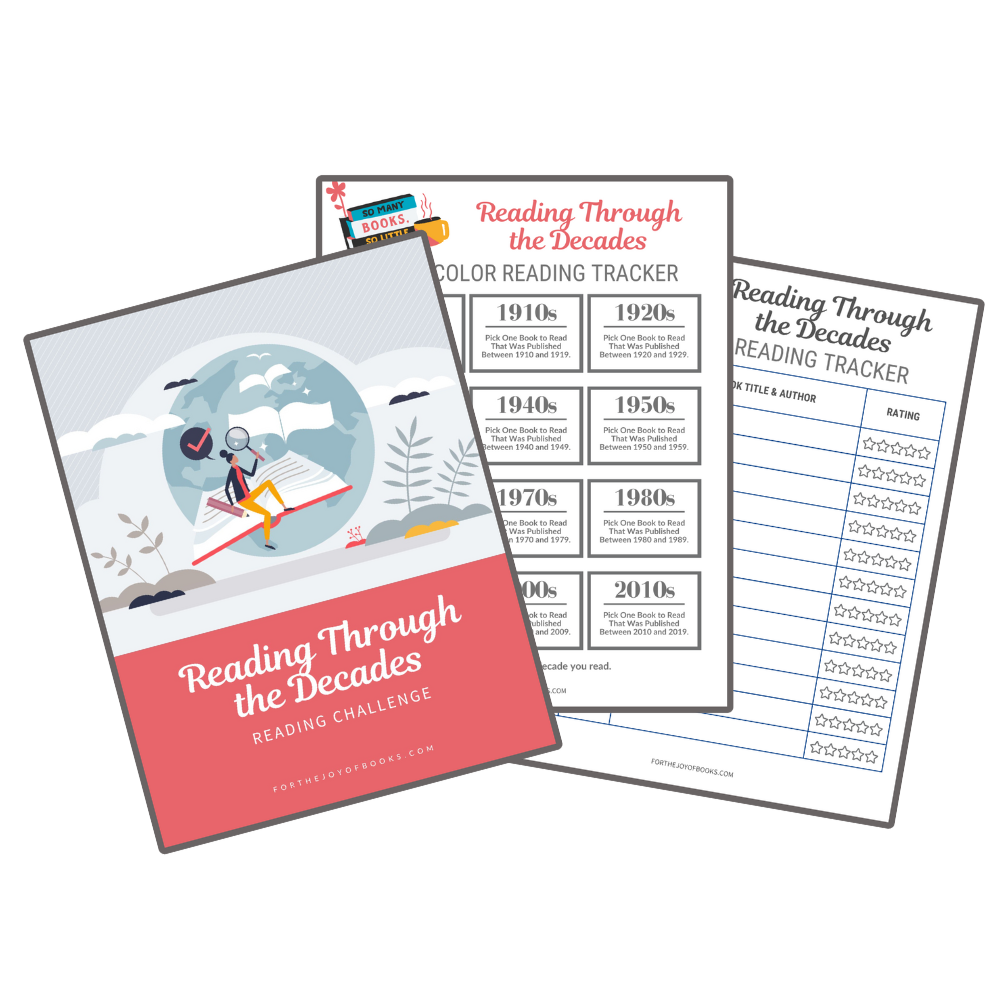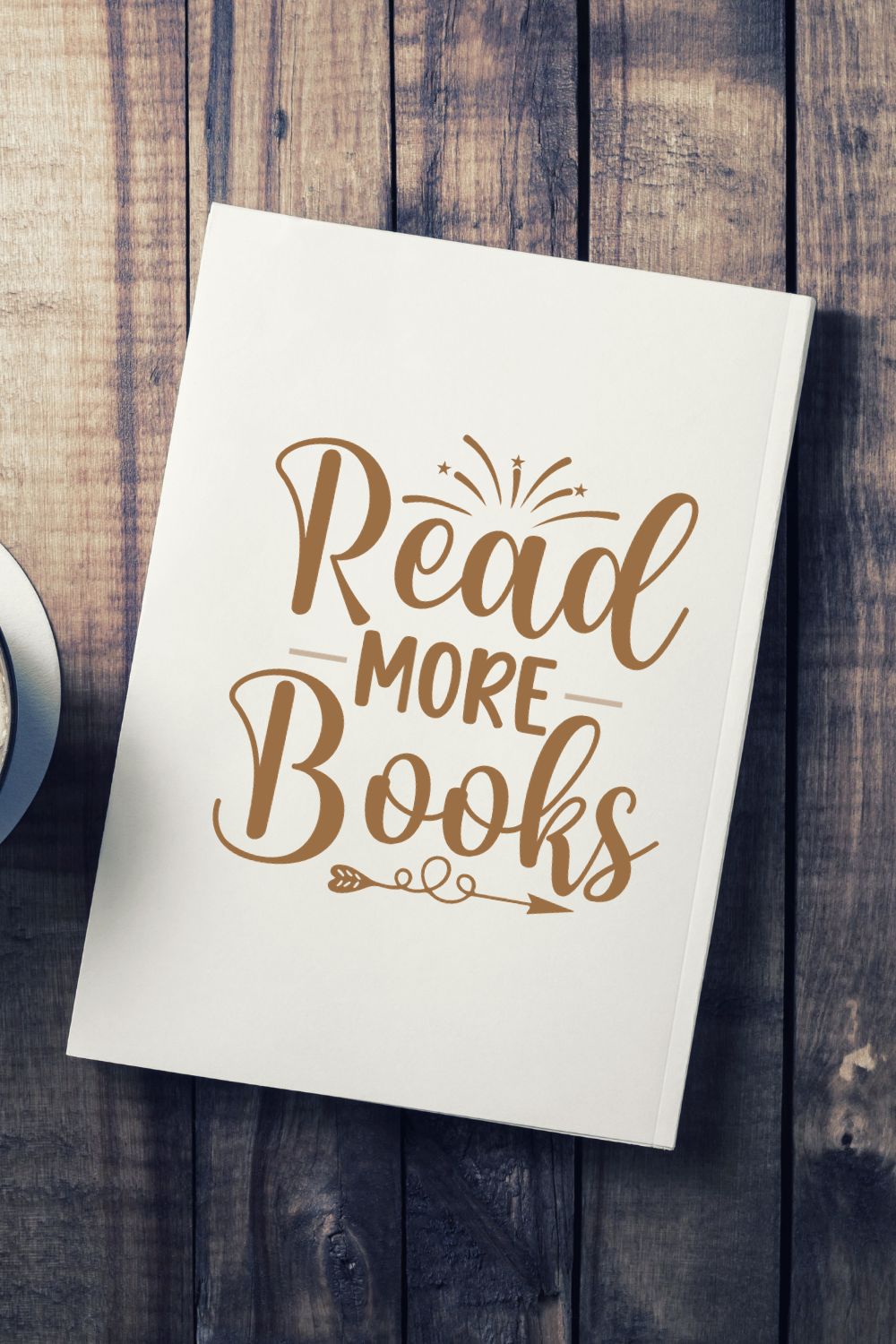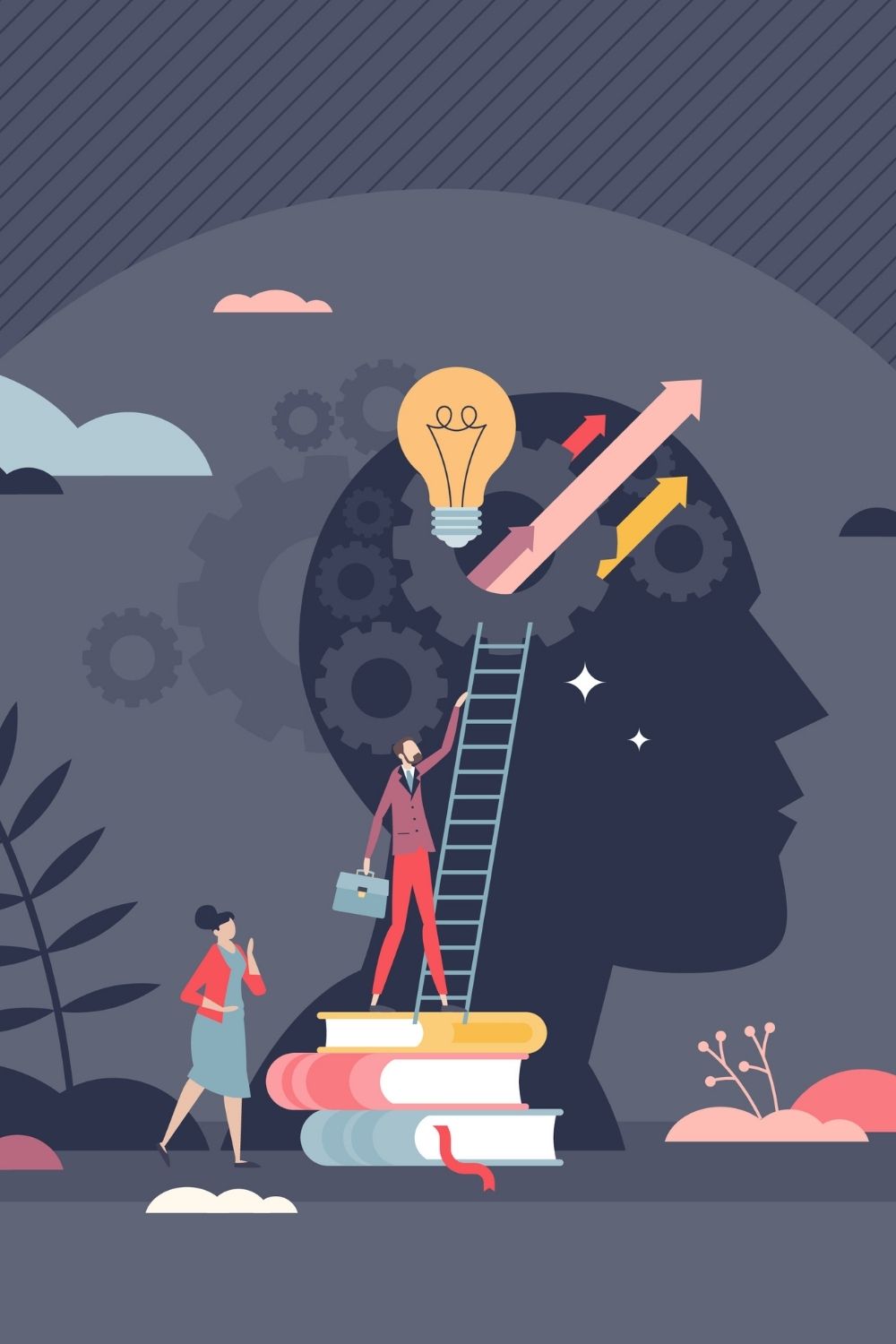This post may contain affiliate links, which means I’ll receive a commission if you purchase through my link, at no extra cost to you. Please read full disclosure here.
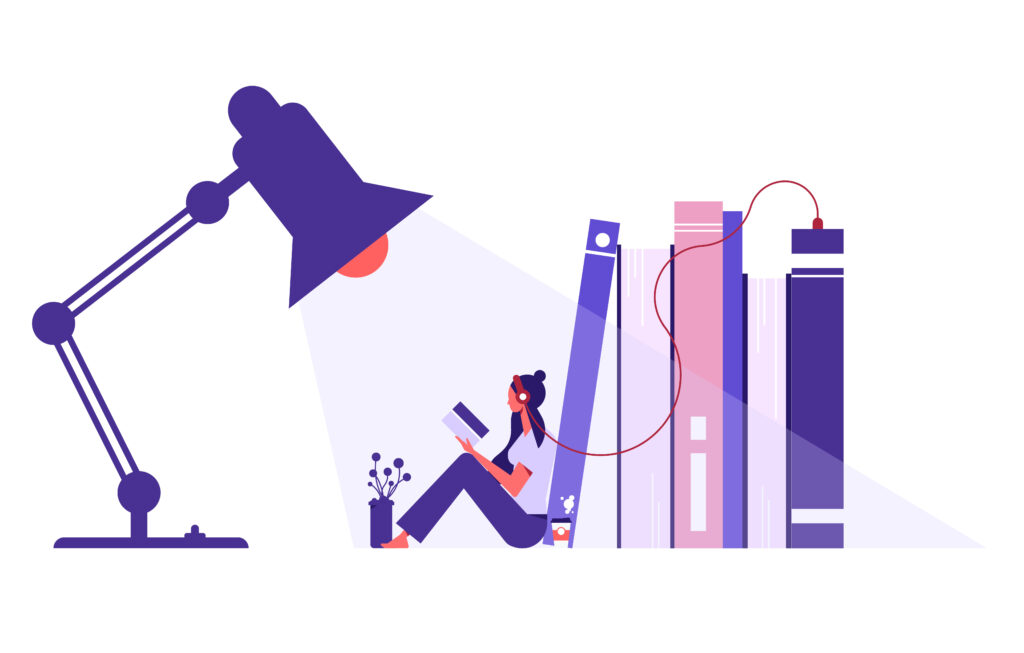
My preferred way of reading a book is the old-fashioned way — with a physical book. But as a working mother of four and an avid reader, I know for a fact that if audiobooks didn’t exist, I wouldn’t read nearly as many books as I do. As a result, I have become a huge fan of audiobooks, as they have become an essential part of my reading life,
And according to the stats, I’m not alone because many people listen to audiobooks. According to the long-running Infinite Dial report, 45 percent of the U.S. population are audiobook listeners. That’s roughly 129 million people.
While audiobooks are not new (I remember checking out audio books from the library in the form of cassette tapes and/or CDs in the 90s), their popularity has grown in recent years with the advent of smartphones and audiobook platforms that allow you to access audiobooks for a small fee every month. (Back in the day, audiobooks were very expensive.) Technology has made audiobooks so easily accessible and affordable.
As the use of audiobooks has increased, it brings up a lot of questions, including but not limited to the following:
- Is listening to an audiobook the same as reading a physical book?
- Does an audiobook count as reading?
- What are the pros of audiobooks?
- What are the cons of audio books?
- Do we learn better when we read the written word or when we listen?
- Do we retain information better when we read or listen?
- What about comprehension?
- Is listening to an audiobook ever better than reading?
- Is the brain activated differently when reading vs listening?
- Are there significant differences between reading and listening?
- Should a reading challenge include audiobooks?
This post aims to answer all these questions and more.
Is Listening to an Audiobook the Same as Reading?
Comprehension
One factor that researchers have looked at is the question of comprehension. Does comprehension go down when you listen to a book versus reading it?
The conclusion is, no.
A 2016 study found “no statistical differences were found” in the comprehension of those who listened to audio books compared to those who read the text.
The study also compared reading and listening to those who did both simultaneously, which resulted in the same conclusion — that there was no significant difference in comprehension.
The audiobook study was performed by Beth Rogowsky, Barabara Calhoun, and Paula Tallal.
The researchers did not just look at immediate comprehension. They also examined comprehension differences between women and men and comprehension differences two weeks after reading or listening to the material.
Men and women were found to have the same levels of comprehension, and all participants had the same level of comprehension two weeks later.
Cognitive Processes
Are there any cognitive differences between reading traditional books and listening? Reading and listening are technically two different skills that activate two different areas of the brain, but when it comes to the mental processes required for language processing, the same areas of the brain are used, according to a neuroscientist.
Neuroscientist Dr. Kristen Willeumier told the health website Well and Good that while speech and print activate the brain differently, “semantic processing of the information occurs in the same cortical areas” and “both formats engage in multiple brain networks.”
“A consistent reading practice strengthens your ability to communicate and will improve your vocabulary, reasoning, concentration, and critical thinking skills while enhancing brain network connectivity,” Willeumier explained.
Reading is a cognitively demanding activity that taps into several areas of the brain. And whether you are reading actual books or listening to the story, the brain still has to work to connect the details together, follow the plot, and make predictions about what’s going to happen in the story, she added.
Prosody
University of Virginia Professor of Psychology and reading researcher Daniel Willingham wrote in The New York Times that one of the differences between listening to the audio version and traditional reading is prosody.
Prosody is described as the pitch, the tempo, and the stress used when pronouncing and speaking words.
When we read, we have to infer meaning from the context in cases where the meaning could vary.
Willingham uses the example of someone saying, “What a great party.” This could be interpreted as a compliment or a put-down.
When reading, we have to figure that out on our own. An audiobook can serve as a tool here by providing the correct tone needed to interpret meaning.
Organization
When reading a print or digital book, Willingham explains that there are organizational content signals such as paragraphs, chapter breaks, and headings.
These things aid readers especially when reading books that address difficult subject matters.
Audiobooks lack these cues you see in a printed book, which means that audiobooks may not be the best choice for all types of content. That being said, several audiobook platforms organize the content into chapters and show how long each chapter will take.

What are the Benefits of Audiobooks?
One of the reasons audiobooks have grown in popularity is because there are so many benefits. Some of these include the following:
- Make Long Commutes More Enjoyable. One of my favorite times to listen to an audiobook is in my car. Long drives can be drudgery, but I now look forward to my long commutes because I know I will also be able to use the time to read a good book.
- May Lead to Greater Empathy. Neuroscientist Kristen Wileumier says listening to audiobooks may lead to greater empathy and increased emotional intelligence. “Listening to an emotionally-driven storyteller engages emotional circuits in the brain and can heighten the intensity and imagery of the episodes, leading to deeper processing of the narrative and greater enjoyment of the material than experienced by reading a book,” she told Well and Good.
- You Can Multitask. One of my favorite parts of this form of reading is that I’m able to get a book in while working on other things. That being said, I have found that this typically only works for me if I’m working on mundane, mindless tasks such as washing dishes, cleaning, folding laundry, or, as I said above, driving. It also doesn’t work if I’m working on a mentally demanding task.
- It Can Be a Group Activity. While I read several books aloud to my kids, we also listened to books together. This can also be a great way to pass time on a long road trip. One of our favorite activities is listening to audiobooks in the morning while driving to school. As of this writing, my six-year-old daughter is obsessed with the audio version of Winnie the Pooh.
- Easily Accessible. With the advent of audiobook apps, I love that I can pop in a book to pass the time if I get stuck waiting somewhere and I forgot to bring a physical book with me.
- Great Performances. Most audiobooks you find today are performed by professional voice actors, and a good audiobook narrator can really make the story come alive. One recording that truly amazed me was Pride and Prejudice, which was read by actress Rosamund Pike. Her rendition of the male voices in the book will convince you that other actors are involved. In some cases, books will be recorded with a full cast. One of my favorites is Daisy Jones and the Six. This book was so well done that I actually can’t imagine the physical book being better, in this case.
- Supports Those With Learning Disabilities. Reading researcher Daniel Willingham wrote in The New York Times that listening to the audio format of a book makes it easier for those who struggle with dyslexia to read books because “they allow listeners to get the meaning while skirting the work of decoding.”
- Supports Those With Visual Impairment. Audiobooks allow blind people and those with low vision a legitimate way to read an entire book without just relying on braille books.
- Helps Reluctant Readers. I think one of the perks of an audiobook is that it may help reluctant readers who are still developing their reading skills be able to read books that are above their grade level.

What are the Benefits of Reading a Physical Book?
The research on the benefits of reading a book is mind-blowing. I often say that if someone could put all the benefits of reading into a pill, we would all be willing to wait in long lines to get it. Here are just some of the benefits of reading a physical book over an audiobook, although these benefits may vary depending on whether we are talking about someone more of a visual learner or an auditory learner:
- Retaining Information. A study done at the University of Waterloo in Ontario, Canada found that when individuals read a written text, whether aloud to themselves or silently, they retain the information better than when listening to the material being read to them.
- It Holds Your Attention Better. The same University of Waterloo study also found that when we read aloud to ourselves, there is a significant improvement in our interest level compared to listening to someone read aloud.
- You Can Highlight or Annotate. I’m someone who likes to highlight, star, and underline favorite passages in books. I also like to write notes in the margins. I will also sometimes take notes in the end pages of a book if I find it makes sense.
- Better for Those With Hearing Impairments. Visual reading works better for those with significant hearing loss or with hearing impairments.
- Better for Difficult Texts. Reading expert Daniel Willingham says that real books are a better option for difficult texts where the aim is learning. When we read, it makes us focus and go at it a bit more slowly. “We reread the hard bits. We stop and think,” Willingham explains. This is “easier with print” when compared to the spoken word.
Do you want to learn more about all the benefits of reading? Check out my in-depth post about the amazing benefits of reading fiction.
What are the Cons of Audiobooks?
- When There are A LOT of Characters. Now, this is just a personal observation, but whenever I listen to a book with A LOT of characters, I find it more difficult to keep track of everyone. (Have you noticed this, too?)
- It’s Slow. Technically speaking, it takes people longer to listen to the audio version of a book than to read it. Studies show that we typically read 200 to 400 words per minute. By comparison, an audiobook clocks in at about 150-160 words per minute.
- You Can’t Highlight or Write in the Margins. I like to underline favorite quotes and take notes in the margins of my books — and not just nonfiction books. While some audiobook platforms have a way to “bookmark” passages you want to remember, it’s simply not as good as with a physical book or ebook.
- Your Mind Wanders More. The University of Toronto study mentioned above also found that our minds wander more when we listen to an audiobook. That being said, the study also found that our minds wander more when we read silently versus reading the book aloud to ourselves.
- Bad Performances. Just like there are great and amazing performances, some bad performances have led me to DNF a book.
- Nonfiction books. Because you can’t highlight or take notes, and our minds tend to wander more when listening to audiobooks, I don’t think they are as good an option when it comes to nonfiction books. That being said, I have listened to several nonfiction books and found that listening to a nonfiction book is a way to determine if you want to buy the physical book. I have done this with a couple of books: Deep Work by Cal Newport, Building a Story Brand by Donald Miller, and Brain Maker by Dr. David Perlmutter.
What are the Cons of Reading a Physical Book?
I don’t believe there are any cons to reading a book, but there are a few downsides when compared to listening to audiobooks. Here are a few:
- No multitasking. One main con of reading a physical book or ebook is that you aren’t able to do other things while reading. This isn’t always a bad thing, but it’s definitely a downside compared to listening to a book.
- Difficult pronunciations. One of the cons of reading is when you have a lot of confusing names or words you don’t know; this is where audiobooks can help improve the reading experience.
- Long books. Holding a tome in your hands can be immensely intimidating. Holding your phone in your hand or your pocket is not. Audiobooks (and ebooks) make long books much more approachable.
- Difficult texts. The same goes for difficult texts. Some books are more challenging to read or get through than others, and if you’re reading a physical book, you are pretty much on your own. This is where an audiobook can be used as a tool to make it easier to get through books that are difficult to read. Next time you want to read a classic book, try listening to it the first time you read it.
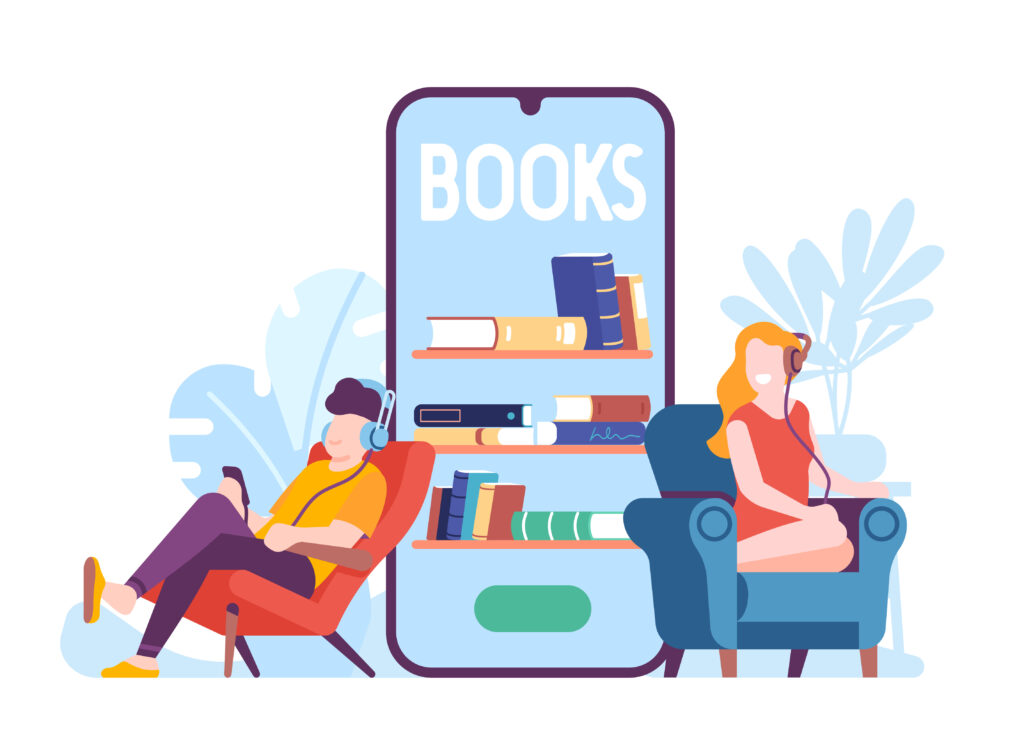
Audiobooks vs Reading: Which is Better?
As someone who has listened to hundreds of audiobooks, the answer to this question is that it depends.
Willingham says that audiobooks and print books seem to be equivalent to narrative texts but not to expository prose. In other words, they seem to work for fiction and narrative non-fiction but may not work as well for informational non-fiction.
“Stories tend to be more predictable and employ familiar ideas, and expository essays more likely include unfamiliar content and require more strategic reading,” he explains.
My experience is the same. I really enjoy fiction books on audio, and even then, there are certain genres that seem to have an edge. Some genres I especially like on audio are mysteries, thrillers, and some literary fiction. Slow-burn literary fiction does not work as well on audio because it may not hold your attention.
While I have tried to listen to some nonfiction prose on audio, if I really liked the book, I ended up buying the physical book because I knew that would be the best format if I wanted to reference it later.
It also depends on the audiobook narrator. In many cases, the narrator’s voice is perfect for the book, and sometimes it doesn’t quite work.
For example, I recently listened to The Ocean at the End of the Sea by Neil Gaiman. Gaiman likes to read his own books, but I sometimes found it challenging to listen to.
Why Audiobooks Have Become So Popular: A Brief History
The truth is that listening to books, or should we say stories, is nothing new.
There is actually a long history of stories being passed down through an oral tradition, which was common in ancient times and before the age of the printing press.
When I was in college, I remember learning that Homer’s Odyssey and Iliad were passed down orally. Those stories are easily as long as a novel. Yet, that oral tradition preserved those stories so that we still have them today.
When I was a kid in the 80s, we used to call audiobooks “books on tape” because cassette tapes were the most commonly used medium of the day. Later on, they were called “books on CD” as compact discs became more common. But here’s the thing… it was expensive to own an audiobook compared to buying a physical book because books on tape or CD were very expensive. Purchasing a physical audiobook could cost $60 a pop or more.
The digital age has changed, and the audiobook market has grown dramatically. In 2022, the audiobook market was valued at $5,364.9 million, and it is expected to grow 26 percent from 2023 to 2030, according to Grand View Research.
Conclusion: Is Listening to an Audiobook Cheating?
At the end of the day, listening to an audiobook is the same as being read aloud to. Maybe you had parents who read books aloud to you or teachers who would read aloud to the whole class.
While we now know that listening to an audiobook is not exactly the same as reading, we also know that there are enough similarities to conclude that listening to the book should still count as reading. This is especially true if you are listening to narrative fiction.
And if you want to listen to the audio version of a book for your book club, no, you are not cheating.
So, enjoy those audiobooks!
